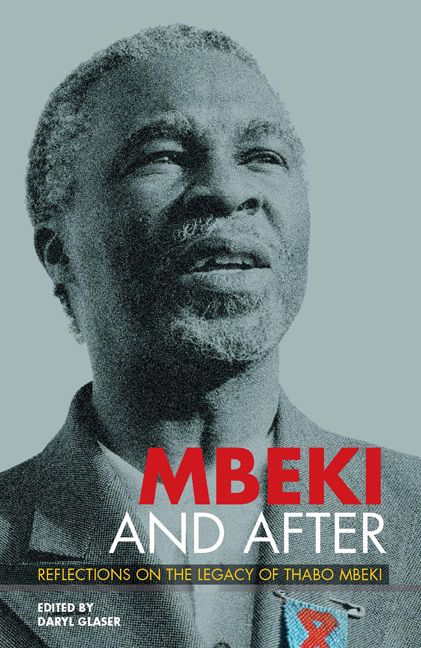Book contents
- Frontmatter
- Contents
- Acknowledgements
- Acronyms
- General Reflections
- 1 Mbeki and his legacy: A critical introduction
- 2 Mbeki's legacy: Some conceptual markers
- 3 Why is thabo mbeki a ‘nitemare’?
- The Mbeki Style Of Governance
- Mbeki And Society
- Mbeki And Race
- Mbeki Abroad
- Notes
- Contributors
- Bibliography
- Index
2 - Mbeki's legacy: Some conceptual markers
from General Reflections
Published online by Cambridge University Press: 21 April 2018
- Frontmatter
- Contents
- Acknowledgements
- Acronyms
- General Reflections
- 1 Mbeki and his legacy: A critical introduction
- 2 Mbeki's legacy: Some conceptual markers
- 3 Why is thabo mbeki a ‘nitemare’?
- The Mbeki Style Of Governance
- Mbeki And Society
- Mbeki And Race
- Mbeki Abroad
- Notes
- Contributors
- Bibliography
- Index
Summary
INTRODUCTION
I think I should make it plain straight off that mine is going to be a little different from most other presentations you will have heard at this Mbeki Legacy Conference and a little different, perhaps, from what you might expect. This is because I'm not going to say much about Mbeki himself and the specificity of what, for want of a better word, I'll call ‘his politics’.
Let me explain what I'm going to do, and why.
Our topic is ‘High Politics’ and this is broken down into four questions:
• To what extent was there a democratic life within the Tripartite Alliance?
• Was parliamentary autonomy stifled?
• Did the Mbeki era lay the ground for a sustainable multiparty, plural democracy?
• What was the relationship between constitutional ideals and the state Mbeki bequeathed?
I'm going to step back, not too far I hope, and treat these questions from the point of view of a conceptual analysis. I'm going to analyse the concepts underlying these questions, the ones upon which these pivot, and see where that takes us.
Running through all these questions – including the second and the fourth, in which the word doesn't appear – is the concept of democracy, the concept of the democratic way – as opposed to the undemocratic way – of doing things political; and this would be the case also if we were, which I think we are implicitly, asking such questions of the post-Polokwane ANC: ‘democracy’ is the lynchpin and nerve centre of all these questions.
So, I'm going to try to distance myself from the cut and thrust (that we were privileged to witness last night) and attempt a very sketchy and preliminary analysis of the concept of democracy and how it functions in South African political discourse today – let's say I'm just ‘posting’ some ‘conceptual markers’ that might be of some use in the eventual evaluation of Mbeki's legacy.
Something Zackie Achmat said last night also suggested to me that the strategy I have chosen is in fact very relevant – I'm in substantial agreement with what he said about Mbeki but was disturbed by what he said about liberal democracy: ‘all democracy is liberal, so it is a tautology and redundant to use the adjective liberal’.
Information
- Type
- Chapter
- Information
- Mbeki and AfterReflections On The Legacy Of Thabo Mbeki, pp. 41 - 50Publisher: Wits University PressPrint publication year: 2009
